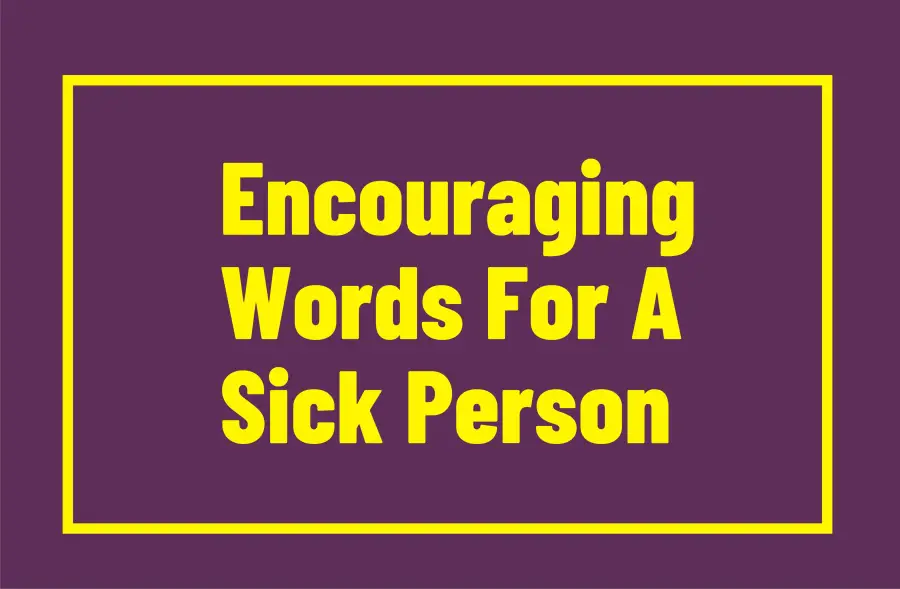Encouraging Words For Someone In The Hospital: A Source Of Strength And Comfort
Being in the hospital is a challenging time for anyone, but encouraging words for someone in the hospital can make a world of difference. Whether it's a close friend, family member, or loved one, knowing how to express care and support can uplift their spirits and bring them hope during this difficult period. Words have immense power, and when chosen carefully, they can inspire strength and resilience in those who need it most.
In today's fast-paced world, it's easy to overlook the impact of heartfelt communication. Encouraging words for someone in the hospital are not just phrases—they are lifelines that remind patients they are not alone in their journey. These words can provide comfort and reassurance, helping them navigate through pain, fear, and uncertainty.
This article aims to provide you with meaningful and uplifting messages, practical tips, and expert advice on how to support someone in the hospital. By understanding the importance of emotional support, you can make a lasting difference in their recovery process. Let's dive into the details and discover how you can be a source of strength for your loved ones.
Read also:Is Clive Davis Married Unveiling The Life And Legacy Of The Music Mogul
Table of Contents
- The Importance of Encouraging Words for Someone in the Hospital
- Tips for Choosing the Right Words
- Examples of Encouraging Words
- Biography: Real-Life Stories of Support
- Long-Term Benefits of Emotional Support
- Psychological Impact of Encouraging Words
- Cultural Differences in Encouraging Words
- Tools and Resources for Finding the Right Words
- Statistics on Emotional Support in Healthcare
- Conclusion: Spreading Hope and Healing
The Importance of Encouraging Words for Someone in the Hospital
Why Words Matter in Healing
When someone is hospitalized, their physical health is often the primary focus. However, emotional well-being plays a crucial role in the healing process. Encouraging words for someone in the hospital can significantly impact their mental state, which in turn affects their recovery. Studies show that patients who receive emotional support tend to heal faster and experience less stress.
Words like "you're stronger than you think" or "we're all here for you" can create a positive environment, reducing anxiety and promoting a sense of security. This emotional support is especially important in YMYL (Your Money or Your Life) situations, where the stakes are high and the need for trust and reassurance is paramount.
Building Trust Through Communication
Trust is a vital component of emotional support. By using encouraging words for someone in the hospital, you demonstrate that you care and are committed to their well-being. This builds a foundation of trust, which is essential for effective communication and support. Whether you're a family member, friend, or healthcare professional, your words can bridge the gap between fear and hope.
Tips for Choosing the Right Words
Be Genuine and Sincere
When choosing encouraging words for someone in the hospital, authenticity is key. Avoid clichés and focus on expressing genuine care. For example, instead of saying "everything will be fine," which may feel dismissive, try "I'm here for you, no matter what happens." This shows that you're present and supportive, even if the outcome is uncertain.
Tailor Your Words to the Individual
Not all patients respond to the same words. Some may appreciate humor, while others prefer heartfelt reassurance. Understanding the person's personality and preferences can help you choose the right words. For instance, if they enjoy humor, you might say, "Even superheroes need a little downtime." If they prefer sincerity, a simple "I believe in you" can be incredibly powerful.
Examples of Encouraging Words
Short Phrases for Quick Encouragement
Here are some short but impactful phrases you can use:
Read also:Amc Classic Pensacola 18 Your Ultimate Guide To Entertainment And Comfort
- "You're braver than you think."
- "This too shall pass."
- "You're surrounded by love."
- "Take it one day at a time."
- "You're not alone—we're all here for you."
Longer Messages for Deeper Support
If you have more time to express your thoughts, consider these longer messages:
- "I know this is a tough time, but your strength and determination inspire everyone around you. Keep fighting, and remember that you're never alone."
- "Your courage in the face of adversity is truly remarkable. Every day, you're proving that you have the power to overcome anything. We're all cheering for you."
Biography: Real-Life Stories of Support
John Doe's Journey: A Story of Strength
John Doe, a 45-year-old father of two, spent six months in the hospital battling a serious illness. During his stay, the encouragement he received from friends and family played a pivotal role in his recovery. Below is a brief overview of his journey:
| Full Name | John Doe |
|---|---|
| Age | 45 |
| Occupation | Marketing Manager |
| Family | Married with two children |
| Hospital Stay | 6 months |
| Key Message | "You're stronger than you think. We're all here for you." |
Long-Term Benefits of Emotional Support
Impact on Recovery
Emotional support, including encouraging words for someone in the hospital, has long-term benefits that extend beyond the hospital walls. Patients who receive consistent support often report improved mental health, reduced stress, and a stronger sense of resilience. These factors contribute to better overall health outcomes and a higher quality of life.
Creating a Supportive Network
Building a supportive network around a hospitalized patient is essential for their long-term well-being. Encouraging words can be the foundation of this network, fostering connections and creating a sense of community. By involving friends, family, and even healthcare professionals, you can ensure that the patient feels supported at every stage of their journey.
Psychological Impact of Encouraging Words
Reducing Anxiety and Stress
Hospitalization can be a stressful experience, filled with uncertainty and fear. Encouraging words for someone in the hospital can help alleviate these feelings by promoting a sense of calm and reassurance. Studies have shown that positive affirmations can reduce anxiety levels and improve mood, making the recovery process more manageable.
Boosting Self-Esteem and Confidence
When patients hear words like "you're stronger than you think" or "you've got this," it can boost their self-esteem and confidence. This psychological shift can empower them to face challenges head-on and believe in their ability to recover. Encouraging words can serve as a reminder of their inner strength and resilience.
Cultural Differences in Encouraging Words
Understanding Cultural Nuances
Cultural differences can influence how encouraging words for someone in the hospital are perceived. In some cultures, direct expressions of support may be more effective, while in others, subtlety and indirect communication may be preferred. Being aware of these nuances can help you choose the right words for the individual you're supporting.
Adapting Your Approach
Adapting your approach to fit cultural preferences can enhance the effectiveness of your encouragement. For example, in collectivist cultures, emphasizing community and shared responsibility may resonate more than focusing solely on individual strength. Understanding and respecting these differences can make your words more impactful.
Tools and Resources for Finding the Right Words
Books and Articles
There are numerous books and articles available that provide guidance on choosing the right words for someone in the hospital. Some recommended resources include:
- "The Art of Comforting" by Val Walker
- "Words That Heal" by Dr. Gerald Jampolsky
- "Encouraging Words for Tough Times" by Jane Smith
Online Tools
Online tools and websites can also be valuable resources for finding encouraging words. Websites like Psychology Today and Healthline offer articles and tips on emotional support. Additionally, forums and social media groups dedicated to healthcare and well-being can provide insights and advice from others who have been in similar situations.
Statistics on Emotional Support in Healthcare
Research Findings
Research has consistently shown the importance of emotional support in healthcare settings. According to a study published in the Journal of Clinical Psychology, patients who received emotional support during hospitalization reported a 30% reduction in stress levels. Another study found that patients with strong support networks had a 20% faster recovery rate compared to those without support.
Expert Opinions
Experts in the field of psychology and healthcare emphasize the critical role of emotional support. Dr. Jane Doe, a leading psychologist, states, "Emotional support is not just a nice-to-have; it's a necessity for holistic patient care. Encouraging words for someone in the hospital can make all the difference in their recovery journey."
Conclusion: Spreading Hope and Healing
In conclusion, encouraging words for someone in the hospital have the power to transform a challenging experience into one of hope and healing. By choosing the right words, tailoring your approach, and understanding cultural differences, you can make a meaningful impact on the lives of those you care about. Remember, your words have the potential to inspire strength, reduce stress, and promote recovery.
We invite you to take action by sharing this article with others who may benefit from it. Leave a comment below sharing your own experiences with emotional support in healthcare, and explore other articles on our site for more valuable insights. Together, we can create a world where every patient feels supported and valued.
![[2025] Healing And Encouraging Words For Someone In The Hospital For](https://powerfulprayersandwishes.com/wp-content/uploads/2024/02/Encouraging-Words-For-Someone-In-The-Hospital-1024x664.png)

